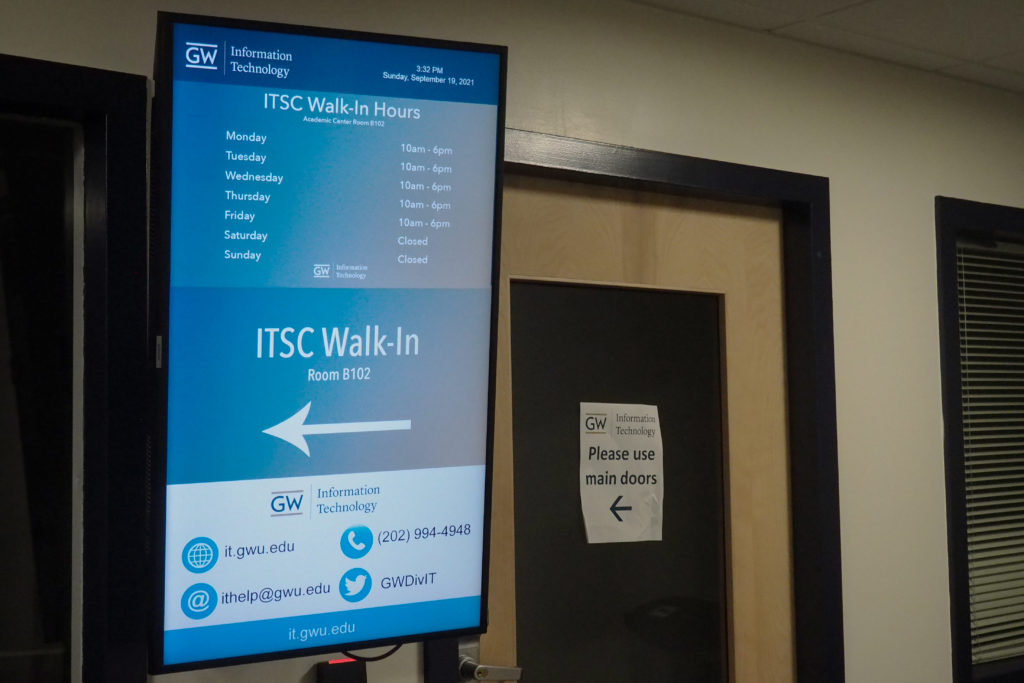GW Information Technology staff received 31 percent fewer support request calls last month than in November 2021, officials reported at the Faculty Senate meeting this month.
Geneva Henry, the vice provost for libraries and information technology, said GWIT received 2693 support request calls last month – a significant decrease from the 3908 it received in November 2021. Henry said the drop follows GWIT’s restructuring into a shared-services model under the Office of the Provost after officials consolidated the University’s decentralized technology services and laid off staff members to decrease costs and mitigate the financial impact of the pandemic during the summer 2020.
Officials moved GWIT under Henry’s leadership in July, following a surge in support requests in fall 2021.
“Going into shared services, it was not only financial and people cuts, but just a change of culture, frankly, to the entire University because this has been a challenge,” she said. “So, yes, it’s been a lot of treading water and trying to keep our heads above water and trying to get the ocean to calm down a little bit, which I think we’ve been successful in doing.”
Henry said GWIT is now divided into five divisions overseen by four associate vice presidents and one director – Academic Technology and Digital Transformation, Enterprise Systems and Development, Cybersecurity, Infrastructure and Research Technology, Business Intelligence and IT Service Delivery. She said GWIT is overseen by herself, Provost Chris Bracey and Sharon Reich Paulsen, the executive vice president and chief administration officer.
GWIT, Academic Technologies and the other technology offices were separated and run by individual schools like the Columbian Columbian College of Arts and Sciences and the Elliott School of International Affairs prior to the consolidation of GW’s technology services into a single body, which led officials to ask employees to reapply for a limited number of positions following the merger.
“There is accountability on all parts of GW for IT because we serve the entire University,” she said.
Henry said GWIT staff answered about 22 percent more support calls last month than in November 2021, jumping from about 74 percent of calls answered to about 96 percent. She said the increased number of support calls answered is a “huge improvement.”
“The message is we’re doing a whole lot better on support, and I hope you’re seeing that,” she said.
Henry said GWIT is upgrading the Banner system, including a new interface that consolidates students’ academic information, like their current GPA and holds that prevent them from registering for courses, into one profile on Banner’s site. She said GWIT has launched that profile along with some other updates, like a feature that allows students to register for courses from a pre-planned schedule and streamlined profiles on students for advisors to view their academic progress.
Henry said the Banner upgrades will also include a redesign of the interface where faculty and staff view their paycheck information.
Officials also upgraded Banner to ensure that students’ updates to their personal information, like their first name, gender identity and pronouns, carry into Banner’s downstream systems so that the information is up to date in all of the University’s databases, Henry said. This upgrade comes after some transgender and nonbinary students expressed frustration for being deadnamed in University communications like emails, despite updating their personal information in GW’s record-keeping systems.
Henry said GWIT is also working towards a “digital transformation” to transition its technology services from onsite systems to systems based in the Cloud.
The Senate also passed a resolution that will mandate all faculty to participate in updated Title IX training each time Title IX policy is revised, asking that the Provost provide “appropriate” communication times, an “adequate timeline” for completion and effective ways for faculty to participate in the training.
This resolution came after President Joe Biden’s administration announced an updated Title IX policy in June that would require all faculty and staff to attend Title IX training and reinstate protections for LGBTQ+ and pregnant students under the Title IX umbrella.
Guillermo Orti, a professor of biology and a faculty senator, said that the lack of faculty participation in current forms of online Title IX training can be attributed to poor communication from the Title IX office.
“The most recent reminder email about Title IX training was sent in July, which is not the best time of year to communicate with faculty,” he said. “A link to this training module also cannot be found on the Title IX office homepage, the only reference we can find anywhere concerning training is from that July email.”
Katrin Schultheiss, an associate professor of history and a faculty senator, said current forms of online Title IX training hardly mention student interactions with faculty and fails to provide a point of contact at the Title IX office for additional questions about Title IX policy.
“It said nothing about the kinds of responsibilities we have, what should we say to a student who implies some kind of abuse, but doesn’t come right out and say it?” she said. “At what point do we have to warn them that we’re reporters? None of that is addressed.”
She said that by passing the resolution and improving Title IX training, the University is sending a message that they care about students and the wider community.
“If we are supposed to be signaling with this training that we take Title IX seriously, this is sending the opposite message that we don’t really care, we just want to tick the box,” she said. “So I just strongly support the resolution.”
Phil Wirtz, a professor of decision sciences and psychology and a faculty senator, proposed an amendment that requires any Title IX training provided to faculty be “reviewed and endorsed” by the senate. The amendment passed with an 11-9 vote, ensuring Faculty approval of any future mandated Title IX training in an effort to reform training and build meaningful relationships between faculty and students.
Caroline Laguerre-Brown, the vice provost for Diversity, Equity and Engagement at GW, said that the University provides training to fulfill its commitment to Title IX education. Laguerre-Brown said despite some thinking the training seems generic, the Title IX training is GW-specific and contains information on Title IX resources at GW.
“The University has a broad commitment that is articulated in many different places in the Title IX policy, in our equal opportunity, anti-discrimination and anti-harassment policy,” she said. “It’s articulated under the D.C. human rights law that we have to follow. And the language appears in several university policies.”
Jim Tielsch, the vice chair of the presidential search committee, said the committee plans to share the shortlist of candidates for the next University president with the GW community in the “very near future.” He said the selection process will include bringing the candidates to campus but said he did not know if the candidates’ names would be made public when they are brought to campus.
Ianne Salvosa and Nick Pasion contributed reporting.











